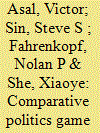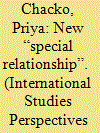|
|
|
Sort Order |
|
|
|
Items / Page
|
|
|
|
|
|
|
| Srl | Item |
| 1 |
ID:
134566


|
|
|
|
|
| Summary/Abstract |
This article argues that long-term changes in Turkish foreign policy are primarily due to the diversification of the country's political and economic interests. Important international structural shifts such as the end of the Cold War or the broad fluctuations in oil prices have constituted the initial impetus for the changes that we have seen in Turkish policies. Discussing alternative perspectives on new activism in Turkish foreign policy, the article gauges Turkey's foreign policy affinity (based on voting patterns in the United Nations General Assembly) and trade with other states to place recent trends in the broader context of the past three decades. It shows that, as the “West” has become less coherent in its policies, Turkey has moved closer to EU members and distanced itself from the US. The data also undermine “shift of axis” arguments as Turkey's foreign policy affinity with Middle Eastern countries has, in fact, declined. The trade data reveal a diversification of the country's commercial interests that contribute to Turkey's increasing regional activism. The country now balances its long term European interests with its recent regional ones.
|
|
|
|
|
|
|
|
|
|
|
|
|
|
|
|
| 2 |
ID:
134567


|
|
|
|
|
| Summary/Abstract |
How do we consolidate developing democratic regimes in the Global South so that the life expectancies of these regimes are considerably sustainable? What have been the key epistemological and normative shortcomings of the mainstream scholarship of democratization? How can we overcome these limitations? Is it necessary to consider the global political economy as a fertile source for deducing some explanatory variables that will help us understand the sources of democratic instability at the national-domestic spheres of political governance? In view of these questions, I contend that there are fundamental limitations in the mainstream scholarship on democratization that we have to overcome. In this essay, I critically appraise the nature of the democratization debate by positing that existing material inequities and injustices in new electoral democracies in the developing world are constitutive of global hegemonic interests that function as the critical determinants of democratic stability. Second, I propose some corrective suggestions that will perhaps inspire a new research agenda about democratization that should overcome the limitations of the current mainstream social science scholarship on democratization. Finally, I articulate some concluding substantive remarks on why we need to bring the global political economy back into our scholarly analyses of democratic consolidation.
|
|
|
|
|
|
|
|
|
|
|
|
|
|
|
|
| 3 |
ID:
134574


|
|
|
|
|
| Summary/Abstract |
Undergraduates often struggle with theoretical perspectives in political science. Often students can get a better handle on theories if they are able to relate them to something tangible in their experience. Lichbach and Zuckerman lay out cultural, rational actor, and structural perspectives as a way to think more systematically about comparative politics but often students struggle with these meta-theories and the different ways they encourage us to think theoretically about comparative politics. In this paper, we discuss a set of exercises that enable students to get a better handle on cultural, rational actor, and structural perspectives on comparative politics by making them “lab rats in their own experiments.” We group these exercises together and treat them as a Comparative Politics Game Show. In this paper, we describe the different exercises and how they were used and our view of the utility of this approach for teaching comparative politics theory.
|
|
|
|
|
|
|
|
|
|
|
|
|
|
|
|
| 4 |
ID:
134565


|
|
|
|
|
| Summary/Abstract |
The development remix, a project initiated at Georgetown University, is a six- to eight-minute-long digital narrative that mixes or edits existing literary or audiovisual representations. The remix project enables development students, scholars, and practitioners to prepare their own narratives about the developing world, through experiencing existing narratives closely, and makes them empathic and critical while humanizing the cultural conditions of poverty in the developing world. The digital remix also actively engages scholars and practitioners with audiovisual representations, rather than as silent observers or readers of fictional texts and visual dramas. After a brief conceptualization on circulation of narratives about the developing world, the article presents the remix technique for the development scholar. The remix is, in effect, a translation with several strengths: it foregrounds the remixer's reflexivity, humanizes the conditions in the developing world, locates voice and agency in development narratives, and presents all narratives as culturally hybrid. These issues have been the subject of not just development research but also social sciences in general, especially on the use of films and fiction in pedagogic practices. Therefore, the usefulness of preparing remixed narratives extends beyond international development studies.
|
|
|
|
|
|
|
|
|
|
|
|
|
|
|
|
| 5 |
ID:
134570


|
|
|
|
|
| Summary/Abstract |
The article attempts to highlight major institutional causes for weaknesses of multilateralism in energy relations between States. In particular, the view defended here focuses on the concept of logic of appropriateness, which helps to conceptualize the level of acceptance of norms and practices. Four various angles of institutions of energy relations are then analyzed: political vs economic angles and rational vs value angles. On these grounds, the case study about the Energy Charter process is then analyzed. In conclusion, the article argues that the Energy Charter process is an explicit attempt to create an international governance, although the issues of acceptance (conflict of appropriateness) is an important barrier to the multilateralism in energy.
|
|
|
|
|
|
|
|
|
|
|
|
|
|
|
|
| 6 |
ID:
134572


|
|
|
|
|
| Summary/Abstract |
This article argues that power transitions generate not just physical security concerns for states, but also “ontological” insecurity, as established identities, hierarchies, and relationships are revised and challenged. It is suggested that seeking out “special relationships” with others is one way in which states seek to mitigate this uncertainty. Through an analysis of the discourse on the “rise of India” from policymakers and commentators in the United States, it is shown that recent US representations of India seek to consolidate a particular US identity, based on the notion of American exceptionalism, and attempt to construct a new “special relationship” with India in order to ameliorate the challenge posed by the rise of China to a US-dominated world order and the assumption of the universality of US ideas and institutions. However, while India–US relations have improved, the relationship continues to be hampered by their differing world-views and self-perceptions, which, as in the past, undermine each other's sense of ontological security.
|
|
|
|
|
|
|
|
|
|
|
|
|
|
|
|
| 7 |
ID:
134569


|
|
|
|
|
| Summary/Abstract |
The article examines the attempt by some academics, think tanks, and policy advisers to discursively link the threat of contemporary maritime piracy with terrorism. While a linkage between certain threats such as the proliferation of weapons of mass destruction, failed states, or money laundering and terrorism has been successful, the effort to connect the notion of maritime piracy and terrorism has failed to reach the discourse of the media and political elite. The article will investigate the arguments made by the proposers of such a linkage and argue that this failure is not so much down to the “real world” absence of a connection between the phenomena, but is made difficult by the romanticized understandings of the “pirate” found embedded in popular cultural narratives and practices. The article will suggest that culturally embedded narratives of piracy found in books and films have greatly shaped our perceptions of contemporary piracy and ultimately influence and limit what we consider plausible in connection to it. In order to illustrate the points made the article will use the example of the piracy narrative in Germany.
|
|
|
|
|
|
|
|
|
|
|
|
|
|
|
|
|
|
|
|
|